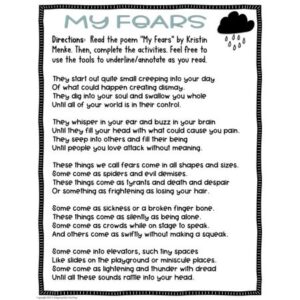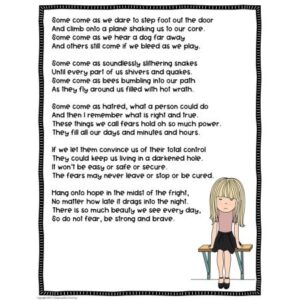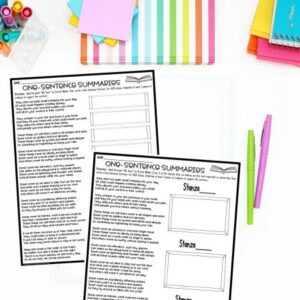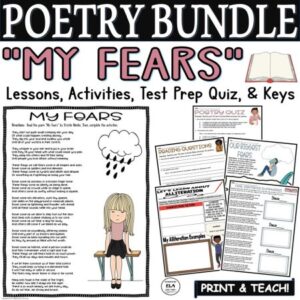Teaching Poetry About Fear-We all have fear, and in the midst of the pandemic, the topic of fear has become ubiquitous. At some point, we have all been afraid of something. As children, we might have feared the monster under our beds, in our closets, or outside our windows. Into our teenage years, we start to feel fear connected to acceptance and rejection, social gatherings and isolation, first loves and breakups, and even the ultimate fear: giving a speech in front of a crowd.
You might have thought I was going to say “death,” but apparently, more people fear public speaking. Who knew that poetry about fear could be so vast?
More than anything we do as teachers, we need to feel free to discuss difficult subjects. Reading poetry about fear can be a simple way to introduce this tough topic. Before, during, and after the reading, we can chat about what we all are afraid of without having to write a full paper or read psychological reports or analyze a full short story or novel that could take days or weeks.
Being afraid is a natural part of human life. For this reason, I wrote the poem “My Fears,” a poem about various types of fears and how to overcome them. Poetry about fear is omnipresent, but the journey to acceptance of fear and being brave in the midst of it is ultimately what we want for ourselves and for our students.
Need help with Test Prep? Check out this FREE Pack of 3 Test Prep Activities to help students achieve success on standardized tests!

How To Teach Poetry About Fear
1. Create a Positive Environment
First of all, we need students to have a place of safety without any sense of judgment when it comes to teaching poetry about fear. To create such an environment, you may have to share your own fears. For example, when I was a kid, I always worried that my parents might die. One day, I thought the worst had happened. I was in my house with my sister, and I couldn’t find my parents. Frantically, I searched everywhere.
I thought they had left, disappeared, vanished from the face of the earth. It didn’t make sense. They were around the house one moment and gone the next.
Then, I called my grandparents to let them know what happened. I was also about to call the police. Finally, I ran around the neighborhood and realized that my parents were talking with neighbors several doors down…that’s it. My fear of something overcame every reasonable possibility for my parents not being in the house. I think this reaction is typical. We don’t see our parents in the store, and we immediately cry out.
Telling relatable stories about your own life will make your students feel more secure in sharing their own fears. You can also preface that they can share about people’s fears in general; they don’t have to be too specific about their own lives. In fact, they might not want to share at all, and that is okay when discussing poetry about fear.
2. Introduce Various Types of Fears
There are so many different fears out there. People can be afraid of snakes, spiders, dogs (yes, I have been bitten 3 times by dogs), other people, clowns, death, cars, bridges, etc. There is no end to the list of fears. Maybe you could have students rate different fears from 1-10 or play 4 Corners with 4 words like Unconcerned, Nervous, Distressed, Terrified. After each round, students can discuss why they chose that word to describe that fear for themselves or for others. I notice that students sometimes have an easier time talking about what their friends or family members might think rather than themselves.
3. Read Poetry About Fear
There are many poems and short stories about fear, but most discuss a specific fear. Check out this poem “My Fears” by me, Kristin Menke! I encourage you to read with your students, so they can hear and understand, instead of immediately concentrating on every word they may or may not know.
4. Activities For Poetry About Fear
- Create summaries- Each stanza exists for a reason. You could have students create One-Sentence Summaries for each stanza and locate evidence to support the summaries!
- Learn about ALLITERATION or other poetic devices- Teaching about alliteration or any other technique helps students to understand how a poem is crafted and analyze why an author would use a certain strategy!
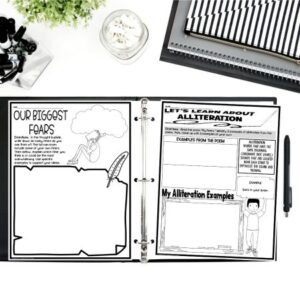
- Write responses- After reading this poetry about fear, students can respond either by answering basic reading comprehension questions in several sentences or discussing the topic and connecting the poem to their own lives!
***After much consideration, I decided to leave out having students visualize their fears. Sometimes, visualization helps me, but many times it merely reinforces the fear. Having students draw out a fear might be too much for them. Now, having them draw or visualize fears from a poem or short story or play might be okay…let’s just be sensitive to each individual student and maybe allow each person a bit of freedom in how to express himself or herself.
5. End On A High Note About Overcoming Fear
Teaching theme is vital for any reading or literature classroom, and teaching poetry about fear requires a lesson on theme! We need students to see that fear is something everyone faces. Some fears will lessen over time, and other fears will grow with different events that occur in life. More than anything, we want to inspire hope. You could have students focus on hope in several ways!
- Create a Hope and Fear Poster-Your students can work independently or in groups to create a visual that will inspire others.
- Develop a plan to deal with fear-They can list activities that they can do instead of becoming paralyzed by fear.
- Write a poem or journal entry-Students can write a poem, song, journal entry, etc. in response to their own fears and how they can see hope in the middle of difficult times.
- Put together a Public Service Announcement-A group can write and perform a public service announcement about fear and how to overcome it.
Here are some other poems your students may never have heard of >>> 5 Fun Poems For Kids
Click here to JOIN my email list for more reading comprehension ideas and to download “13 Effective Ways To Integrate Test Prep Into Your Classroom!”


